Dorothy Glover (1914-1992)1
by Alan Glover
EXTRACT FROM OHTA NEWS (JULY 2001), pp. 15-17.
A shorter version of this article had appeared in The Investigator (magazine of the Geelong Historical Society), vol. 32, issue 2, no. 127 (June 1997), pp. 57-60.
While organ playing in mid-20th century Australia was primarily a male preserve, a relatively small number of accomplished woman organists played in substantial churches, mainly suburban or in the provincial cities. This redressed the commonly held notion that a women organist was that lady who played the country church harmonium. My sister, Dorothy Glover, of Geelong, was one of those comparatively few young women whose aspirations led from the piano to the pipe organ.
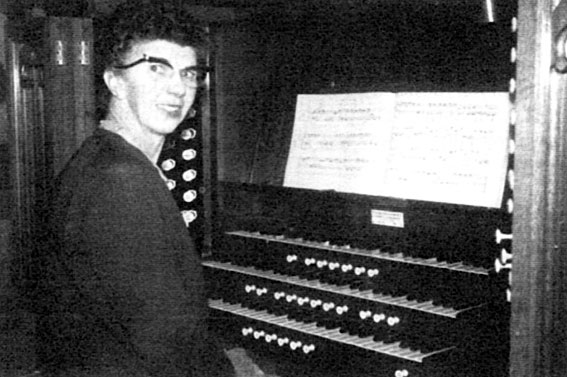
Dorothy Glover at St John's Anglican Church,
Launceston, Tasmania (Alan Glover)
After leaving school at 'Morongo', Geelong, in 1929, Dorothy expressed a wish to learn to play the pipe organ, having taken piano lessons throughout her schooldays. Her father's reaction was typically conservative, regarding the organ as a man's instrument: "My sisters never played the organ." Dorothy persisted, so father consulted his friend Oswald Hearne who had recently installed a pipe organ in his home 'Montana' on the Esplanade, Geelong. Mr Hearne encouraged the idea and introduced Dorothy to Frederick Earle, the very fine organist of St Mary of the Angels, Geelong. He agreed to teach Dorothy at St Mary's provided that she intended to take it seriously. To make the point he told her that when he was organist of the large parish church at Portsea, England, he used to practise up to eight hours a day. Incidentally, his grandson is Dr Robin Batterham, Commonwealth Chief Scientist, who is also an organist and assists at The Scots' Church, Collins Street, Melbourne.
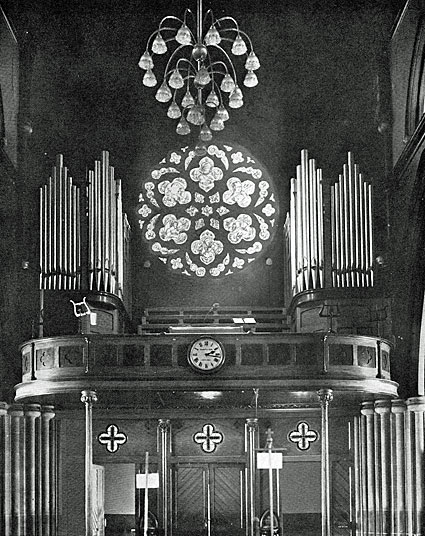
1930 Fincham & Sons organ at St Mary of the Angels
Catholic Church, Geelong
(Organs of the Catholic Church, George Fincham & Sons, 1931)
In 1932, when unemployment was rife, Fred Earle had the good fortune to be appointed librarian at 3LO, Melbourne. He had earlier said that he wanted to move to Melbourne, remarking, "If I could get my behind on the seat of a Wurlitzer organ in a city theatre no-one would get me off it!" This was an indication of his versatility as an organist. This dream was not fulfilled; instead he became accompanist to the Village Glee Club broadcasting from 3LO, along with his work as librarian. However, St Mary's had been left with the problem of finding an organist to succeed Frederick Earle. He went to Monsignor Benson and told him he believed that within six months his pupil, Dorothy Glover, would be able to play the settings of the Mass. Some of these, by composers such as Gounod and Mozart, were of an almost operatic nature.
Hours of solid practice lay ahead of Dorothy when she agreed to try to meet the challenge, helped by the fact that she was a very good sight reader. An ingenious arrangement was worked out whereby for the next few months Fred Earle, who did not own a car, would take the Sunday morning train, arriving at Geelong about 11.30 am, there being no earlier one. Our mother would meet him at the station and drive him smartly up to St Mary's where he would slide onto the organ stool, taking over from Dorothy who had prepared and played the first half hour or so of the service. This arrangement worked well and before the six months was up, Mr Earle told the Monsignor that Dorothy was ready to take over full time. This meant two services a Sunday as Fred Earle returned to Melbourne after lunch, but Dorothy had been playing the relatively easy service of Benediction ever since her tutor had left Geelong.
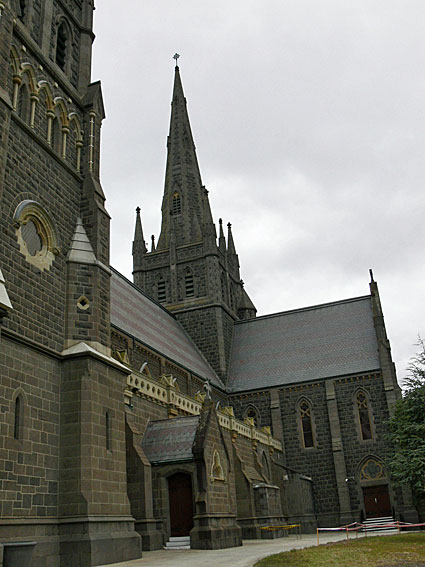
St Mary of the Angels Catholic Church, Geelong
(John Maidment)
Dorothy came to love her musical life at St Mary's where she had a happy relationship with Signor Candela, the conductor (Candy to them all). He was later succeeded by Percy Jones, a well-known Geelong musician and father of his better-known son, Father Percy Jones, long-time Director of the choir of St Patrick's Cathedral, Melbourne. The priests at St Mary's were most welcoming towards Dorothy and no-one appeared to mind that she was not of the faith. Never was any pressure put on her about this, contrary to the prediction of some of her friends.
Although Dorothy taught herself much of the music she played, she missed the guidance of an experienced teacher until the mid-thirties when a great opportunity presented itself. The City Organist of Melbourne, William McKie, had been appointed Director of Music at Geelong Grammar School and, on being approached by Dorothy, agreed to teach her at St Mary's - "you will be my only female pupil." She found him to be a most exacting yet inspiring teacher. She would return from her lesson for which she had felt she was well prepared (correct notes were taken for granted) only to have found that he had much to change, particularly in the phrasing of Bach fugues. Once, as her lesson day was approaching, William McKie rang to say that commitments in Melbourne would prevent him from coming to St Mary's but if Dorothy could come up to Melbourne he would give her the lesson on the Town Hall organ. Could she ever! This unfortunately was a once only experience. It was a sad day for Dorothy when W.N. McKie left Australia to take charge of the music at Magdalen College, Oxford. He was of course later to become Sir William McKie, Organist and Master of the Choristers at Westminster Abbey where Dorothy met him again in 1947.
Back to St Mary's: the great day came in 1937 when the wall dividing the original nave from the extensions was removed and one could look from the organ gallery right through to the chevet of five small chapels behind the high altar. The service to commemorate the completion of the church was an impressive pontifical High Mass, with much care and thought devoted to the preparation of the music. The quaint Miss Passalague, who reported services for the Geelong Advertiser, wrote that "Miss Dorothy Glover presided at the organ with her usual ability."
Alas, only a year later a papal edict (since repealed) disallowed non-Catholics from playing in Catholic churches. Dorothy went to Monsignor Benson to resign. He replied, "I do not accept your resignation Dorothy, I shall say who plays in my church." The good monsignor was to find himself overruled, so Dorothy sadly left St Mary's. On her departure Dorothy was presented with a beautiful two-volume set of Schweitzer's The Organ Works of J.S. Bach. She was to look back on her time at St Mary's as one of the happiest experiences of her long musical life.
During 1938 Dorothy wished to learn about choir training so she approached Dr A.E. Floyd at St Paul's Cathedral, Melbourne, who invited her to attend boys' practice in the choir room. She and A.E.F. got on famously, partly through sharing a similar sense of humour. When World War 2 robbed Dr Floyd of his male assistants playing the organ for the regular post-evensong full choir practice each Thursday, he asked Dorothy to step in. She thus gained valuable experience in accompanying the Anglican service.
Part of Dorothy's arrangement with Dr Floyd was to have occasional organ lessons. Amusingly these almost never took place. He would tell her to practise until he arrived. Towards the end of the lesson time he would appear beside Dorothy at the console and say he had been in the cathedral listening and that she was doing very well. Privately Dorothy would wonder if his listening time was while he walked into the cathedral from the car park. Anyway she had enjoyed practising on the glorious T.C. Lewis organ.
Meanwhile, back in Geelong Dorothy was applying Dr Floyd's methods of choir training at St Paul's Church where she became organist and choir mistress in 1940. Her success in this dual position is recalled by Mr Ray Lancaster of Torquay who was head boy chorister at this time. The following are excerpts from his letter to the editor of The Investigator, magazine of the Geelong Historical Society, in 1997 in response to an earlier article on Dorothy:2
During her time there she lifted the quality of church music to a very high level, i.e. sung liturgies, anthems and an almost fanatical detailed attention to the singing of psalms and hymns.
One of her enduring accomplishments at St Paul's was a large boys' choir of which I was a member. Dorothy took a personal interest in each and every one of us. . . . It was a very sad day when she told us she was going to live in Melbourne to further her musical ambitions. The people of St Paul's gave her a send-off with kind wishes and gifts. Amongst these was a photograph of the boys' choir in their robes of office. As the senior boy I was called to make the presentation. It was a moment I shall never forget.
. . . I am most grateful for the love and understanding she gave me, not only of music in general but the organ in particular. My formative years would have been very dull indeed without her influence.
. . . This is a letter of total love and appreciation of all this wonderful lady did for so many young boys at St Paul's, Geelong, especially myself.3
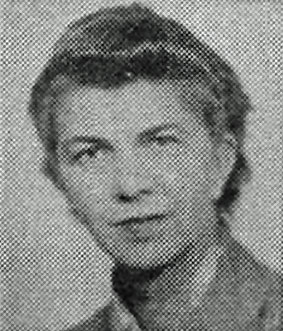
Dorothy Glover
[from The Investigator, vol. 32, issue 3, no. 128
(September 1997), p. 93.
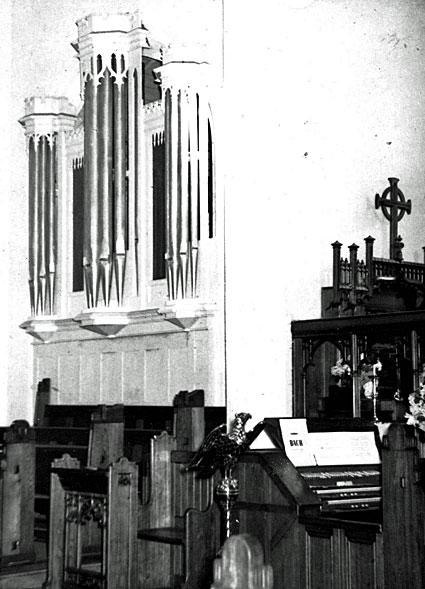
The John Smith & Sons case at St Paul's Anglican Church, Geelong
(Robert Joyce)
In early 1944 Dorothy moved to Melbourne. She had asked her friend John Brockman if he would consider taking over from her at St Paul's, Geelong. John said he would give it a six months' trial. Today, some 57 years later, John Brockman is still directing the music at St Paul's, known well beyond Geelong for his distinguished service in that position. The annual Christmas Carol service, for instance, is so well attended that it takes place to packed congregations in the afternoon and again in the evening on the Sunday before Christmas. There is probably no finer carol service to be heard anywhere in the country. Dorothy, with typical humility, remarked after attending it in 1985, that undoubtedly one of the best things she had done musically was to leave St Paul's!
From 1944 to the end of 1946 Dorothy was principal assistant to Dr Floyd. In January 1947, about the time of his resignation from St Paul's Cathedral, he came down to Port Melbourne to see Dorothy, our mother and myself off to England. He looked forward to beginning a new musical life and indeed he lived until 1974, passing away at 97 years of age.
In England Dorothy passed the A.R.C.O. examination but, wishing to be free on Sundays to attend service at various churches and cathedrals, she limited her organ playing to deputising and occasional recitals at St Stephen, Walbrook, a City of London church. She also took adult music class work with the London County Council for a number of years.
At the instigation of Dr Floyd by letter, Dorothy met in London and became firm friends with Lindsay O'Neill, organist of St John's, Launceston, Tasmania. In later years Lindsay asked Dorothy to deputise for him there from 1962 while he revisited England to gain his F.R.C.O. and further his experience. Dorothy enjoyed three years at Launceston training the choir and playing the magnificent organ of St John's.
Early in 1966 England beckoned again and Dorothy joined the visiting music staff at Winchester College where she taught until 1975. During this time the college organist, Raymond Humphrey, took six months leave to visit South Africa and Dorothy became the only woman chapel organist in the 600 year history of the college.
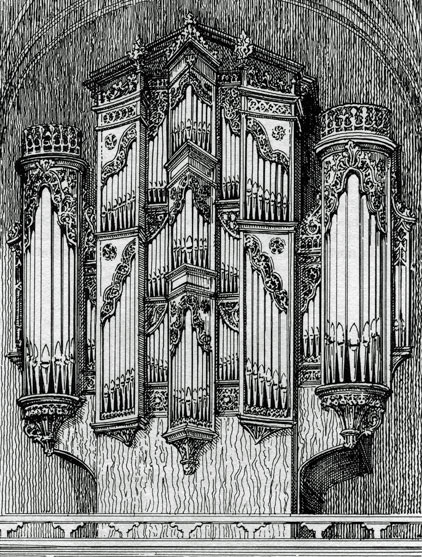
The 1908 Norman & Beard organ at Winchester College;
Case by W.D. Caröe
(drawing by Herbert Norman)
In 1975 Dorothy and her mother returned to Tasmania to live in semi-retirement. Dorothy founded the Launceston Chamber Music Club of which she was made an honorary life member in 1985. During those years she fulfilled a long-held wish to learn to play the cello, taking her place in the local ensemble. "Some notes I only pretend to play!" she said of her cello performance.
Full retirement came in 1984 when, following the death of our mother, Dorothy decided to spend her remaining time in her birthplace, Geelong. She was soon asked by John Brockman to take the weekly afternoon boys' practice at St Paul's which she was happy to do. She also joined the committee of the Geelong Musical Society on which she served until her final illness.
One week before her death in November 1992 I drove Dorothy to St Mary's where we paused while, from the car, she looked at that lovely entrance through which she had first passed as organist 60 years earlier.
Dorothy Glover was a fine organist and endearing personality, much loved and respected by all who knew her.
_____________________________________________________________________________
1 Dorothy Glover's birthdate is recorded in The Geelong Advertiser (6 March 1914), p. 1.
2 Alan Glover, 'Dorothy Glover,' The Investigator, vol. 32, issue 2, no. 127 (June 1997), pp. 57-60.
3 Raymond W. Lancaster, 'Letter to the Editor,' The Investigator, vol. 32, issue 3, no. 128 (September 1997), pp. 93-94.
[The information contained in the above footnotes was kindly supplied by Ms Vicki Montgomery of the Genealogical Society of Victoria]